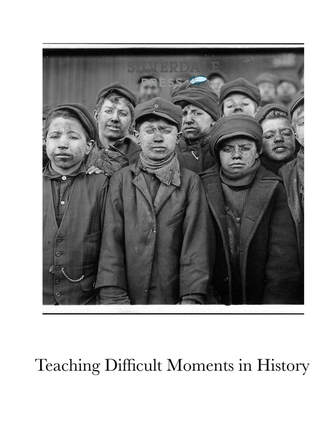 Not every moment in human history is sunshine and progress. While there is much to celebrate about our story, human history is, well, human. Human nature is flawed. The result of imperfect people moving through time is this: there are dark spots in the historical record. Slavery, oppression, and war are just a few common threads woven through history. Though we may want to hide difficult historical moments from our children, there is much to be gained from teaching about them. Difficult Moments in History... Are Eye-Opening “Wow, Mom, I had no idea…” Difficult moments in history are eye-opening. Why are they eye-opening? Let’s say you just learned about William Wilberforce and the movement to abolish the slave trade in Britain. As part of that, you learned about the horrid conditions of slave ships during the middle passage. “So much misery condensed in so little room, is more than the human imagination had ever before conceived,” Wilberforce told the House of Commons in 1789. Why is this valuable to your student’s learning? It opens their eyes to what humans are capable of. It opens their eyes the importance of leadership and wise decisions. It helps them understand where we have been and who we are today. Create Empathy Learning about difficult moments in history creates empathy. Why? Human suffering accompanies any difficult moment in history. Empathy is the ability to understand another person’s thoughts and feelings from their point of view, rather than from your own. Empathetic people can imagine themselves in the place of people in history and understand what they are thinking and feeling. How would your student feel living in the Jim Crow South? How would your student feel as a front-line soldier launching the D-Day attack on the beaches of Normandy? Exposing students to hardship and suffering creates empathy for our fellow human beings. Foster Gratitude Learning about difficult moments in history makes children grateful for the times in which they live. Our world today is by no means perfect. But there are freedoms and conditions that children of today enjoy that children of yesteryear did not. How would your teen girl think about her right to vote if she knew that suffragettes were jailed and force-fed so she could have that right? She probably would be grateful for the sacrifice others made on her behalf and would think twice about taking that right for granted. The History of Child Labor One such difficult moment in history is child labor. While child labor is still practiced today, especially in Africa and Asia, it was practiced in the U.S. in the not-so-distant past. In fact, it was not until 1938 that child labor was outlawed in the U.S. Before then, children worked long hours in homes and factories. Conditions were poor, they were paid very little, and they went to school only irregularly. In just a couple of weeks, Americans will come together to celebrate Labor Day. More than just a day off of work and school, this holiday gives people a chance to reflect on the past and future of the American worker, and the history of laborers in the U.S. and across the globe is a difficult one. But it's also a great opportunity to create empathy, foster gratitude, and open your child's eyes. Interested in learning more? Check out our homeschool Labor Day Unit Study from our White House holidays series!
0 Comments
Leave a Reply. |
Silverdale PressCheck out our About Page to learn more about us! Categories |

 RSS Feed
RSS Feed